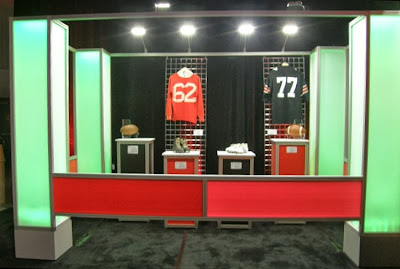
The next major scheduled event on the RedBlacks calendar is the expansion draft in December. While we wait for that, I thought it might be interesting to revisit how the Ottawa Renegades handled their own version in early 2012.
The rules were different for the Renegades. You have likely read that existing CFL clubs will have the opportunity to protect one quarterback instead of two. Quarterback availability was a significant issue in draft rule negotiations between OSEG and the CFL. In hindsight (or perhaps from the time the rules were announced for the Renegades, I don't recall), it was felt that allowing teams to protect two in 2002 offered far too few options to the fledgling club. You'll note from the list below that no QB's were selected; Dan Crowley was signed as a free agent.
Aside from making more quarterbacks available, the only other major difference between expansion drafts systems is that the RedBlacks one is more front-heavy. The Renegades could skip making a selection from a club and instead obtain a draft pick from that club.
That's potentially helpful towards building a team in the future, but less so in terms of being competitive early. By comparison, the RedBlacks have already been able to draft a handful of players and will get another 24 in December compared to the 19 that the Renegades gathered almost 12 years ago.
So who DID we get? See below:
From BC:
FB Mike Maurer
WR Jimmy Oliver
2002 2nd round draft choice
From Calgary:
DT Clinton Wayne
CB Ricky Bell
LB Kelly Lochbaum
From Edmonton:
OL George Hudson
DE Fred Perry
DB Andrew Henry
From Hamilton:
LB Matt Robichaud
OT Seth Dittman
C Carl Coulter
From Montreal:
LB Kelly Wiltshire
LB John Grace
2002 2nd round draft choice
From Sask.:
S Shawn Gallant
LB Troy Asbell
2002 2nd round draft choice
From Toronto:
PK Dan Giancola
C Earl Scott**
2003 2nd round draft choice
From Winnipeg:
S Donnie Ruiz
LB Sefa O'Reilly
2003 2nd round draft choice
** Scott was later traded back to Toronto for WR Grayson Shillingford.
The jewel was clearly linebacker John Grace, who was named a league all-star following the 2002 season, yet he was traded a year later. He teamed with Kelly Wiltshire to form the beginnings of a quality, young linebacking corp for the club.
Jimmy Oliver led the team in touchdowns (with a rather modest six, mind you) and was the team's first 1000-yard receiver. He did not return in 2003 due to a contract dispute.
Fred Perry spent the 2002 season in Atlanta, but when he finally did appear in 2003, he tied for the team lead in quarterback sacks with seven.
From memory, George Hudson and Donnie Ruiz would be the only two players to be with the team during its entire four-year existence.
Several players were complete non-contributors. O'Reilly was damaged goods. Robichaud only played in three games and I seem to recall that he wanted nothing to do with being in Ottawa. Giancola is also a one-game guy. I believe Kelly Lochbaum didn't make it through camp and returned to the BC Lions, playing with them through to 2005. Andrew Henry seemed to simply disappear.
So some good, some bad, come middle ground.
Frankly, I think a more competent coaching staff could have drawn more from what was obtained. Aside from the QB situation, it seems like the problem with a future-based expansion system is that you need the actual players selected to contribute long enough for your draft picks and young free agent signees to get up to speed.
In the case of the Renegades, most of the successful expansion draft choices were gone within two seasons and future drafts were largely unproductive.










